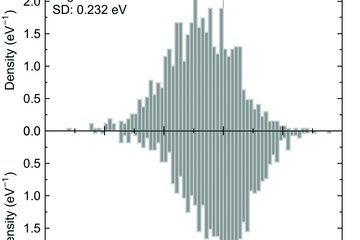All genres
201.
Talk
Using ab initio methods to predict thermodynamic properties of metals. Summer School: Computational Materials Science, San Sebastian, Spain (2010)
202.
Talk
Ab initio concepts for an efficient and accurate determination of thermodynamic properties up to the melting point. Calphad XXXIX, Jeju Island, South Korea (2010)
203.
Talk
First principles determination of phase transitions in magnetic shape memory alloys. Calphad XXXIX, Jeju Island, South Korea (2010)
204.
Talk
Computing Ab Initio Free Energy Contributions of Point Defects. DPG Frühjahrstagung 2010, Regensburg, Germany (2010)
205.
Talk
Ab initio determination of the magnetic free energy contribution of metallic systems. DPG Frühjahrstagung 2010, Regensburg, Germany (2010)
206.
Talk
Ab initio determination of the magnetic free energy contribution of metallic systems. APS March Meeting 2010, Portland, OR, USA (2010)
207.
Talk
Computing Ab Initio Free Energy Contributions of Point Defects. APS March Meeting 2010, Portland, OR, USA (2010)
208.
Talk
Computing Ab Initio Free Energy Contributions of Point Defects. 139th Annual Meeting of the Minerals, Metals and Materials Society (TMS), Seattle, WA, USA (2010)
209.
Talk
Towards a First-Principles Understanding of the Iron Phase Diagram. 139th Annual Meeting of the Minerals, Metals and Materials Society (TMS), Seattle, WA, USA (2010)
210.
Talk
Ab initio determination of the magnetic free energy contribution of metallic systems. Computational Materials Science on Complex Energy Landscapes Workshop, Imst, Austria (2010)
211.
Talk
Ab initio up to the melting point: Efficient sampling strategies of anharmonic free energies. Computational Materials Science on Complex Energy Landscapes Workshop, Imst, Austria (2010)
212.
Talk
Towards ab initio assisted materials design: DFT based thermodynamics up to the melting point. PhD-Defense at University of Paderborn, Paderborn, Germany (2009)
213.
Talk
Ab initio up to the melting point: Anharmonicity and vacancies in aluminum. MRS Fall Meeting, Boston, MA, USA (2009)
214.
Talk
Quantum mechanically based modeling of temperature driven materials phenomena. Colloquium "Material Science on Supercomputers", MPIE, Düsseldorf, Germany (2009)
215.
Talk
Towards a first-principles understanding of the iron phase diagram. Euromat 2009, Glasgow, UK (2009)
216.
Talk
The accuracy of first principles methods inpredicting thermodynamic properties of metals. XVIII International Material Research Conference, Cancun, Mexico (2009)
217.
Talk
Ab initio investigation of temperature-driven martensitic transformations: Case study for alkali earth metals. DFG-Nachwuchsakademie Begutachtung, Bonn, Germany (2009)
218.
Talk
Ab Initio Thermodynamics: Status, applications and challenges. The second Sino-German Symposium on “Computational Thermodynamics and Kinetics and Their Applications to Solidification”, Kornelimünster/Aachen, Germany (2009)
219.
Talk
First principles determination of phase transitions in magnetic shape memory alloys. 2nd Sino-German Symposium on Computational Thermodynamics and Kinetics and their Application to Solidification, Aachen, Germany (2009)
220.
Talk
Role of Atomistic Simulations in the Prediction of Thermodynamic Properties of Materials. Workshop on Multi-Scale Computational Materials Design of Structural Materials, POSCO international center, Pohang, South Korea (2009)











